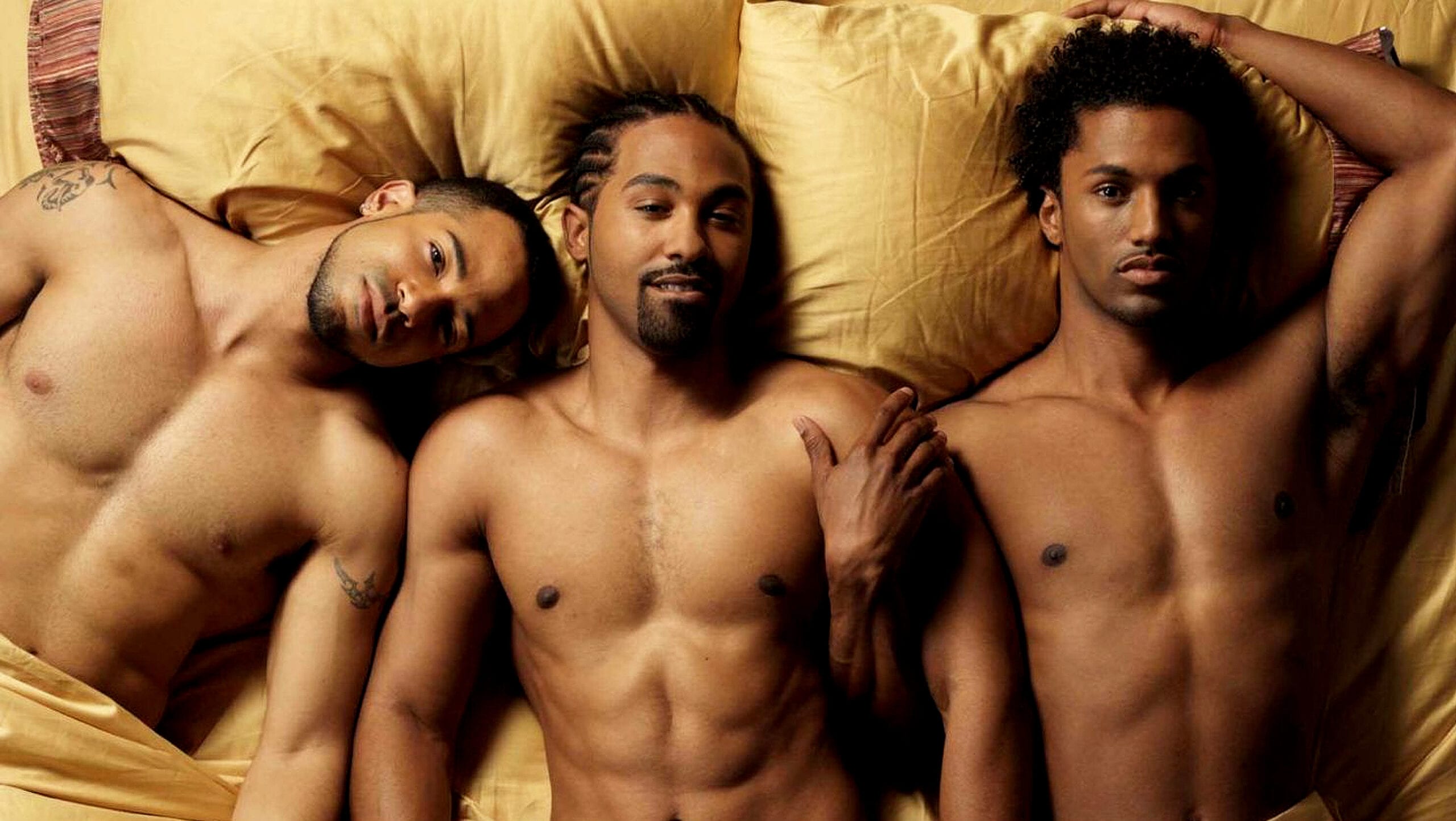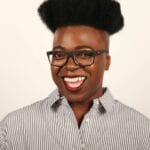Noah’s Arc, the Patrik-Ian Polk-created dramedy series, is queer canon. An inspiration to generations of Black (and brown) LGBTQ2 folx, the show, which centered on the lives of four Black gay best friends living and loving in Los Angeles, was the first time many of us saw ourselves on screen beyond the stereotypes that plague Black queer characters in film and televison.
Imagine the heartbreak, then, when LogoTV cancelled the show—its highest-rated at the time—after two successful seasons in 2006. Though we were given a movie, Noah’s Arc: Jumping the Broom, two years later to wrap up the show’s storylines, it always felt like there was more to be mined in the world Polk created, prompting continuous calls for a reboot in the 12 years that followed. Our prayers have finally been answered. Sort of.
On Sunday, Polk is reuniting his cast for a 15th anniversary virtual reunion episode titled “The ‘Rona Chronicles,” which will stream 8 p.m. EDT/ 5 p.m. PDT on Patrik-Ian Polk Entertainment’s Facebook and YouTube pages. It’ll be followed by a cast Q&A, moderated by Queer Eye‘s Karamo Brown.
For the unaware, the series followed Noah, a screenwriter living in Los Angeles—played by Black, gay icon Darryl Stephens—and his three friends. There was Rodney Chester as Alex, an HIV/AIDS educator; Christian Vincent as Ricky, a promiscuous boutique owner; and Doug Spearman as Chance, an economics professor. The show also featured Jensen Atwood as Wade, a fellow screenwriter who comes out as gay after falling in love with Noah; the legendary Wilson Cruz as Junito, a doctor and love interest for Ricky; and Gregory Keith and Jonathan Julian as Alex and Eddie’s partners.
While definitely ahead of its time, Noah’s Arc still stands alone as one of few, if not the only, scripted series to be centered on Black queer men. And though shows like Empire and Pose have definitely pushed the envelope of what Black LGBTQ2 storytelling can look like, Polk’s series—which he also wrote and directed—is by far the prototype, which has, in my opinion, yet to be topped.
The reunion episode, which picks up some 10 years after Jumping the Broom in the midst of our current COVID-19 pandemic (hence “The ‘Rona Chronicles”), doubles as a fundraiser for Birmingham AIDS Outreach, CASA Ruby, G.L.I.T.S., In The Meantime Men’s Group, LGBT Detroit, Mobilizing Our Brothers Initiative and The Oakland LGBTQ Community Center. Ahead of the special, I spoke with Stephens about the character of Noah, his enduring impact on the community and the ongoing hopes for a full-on reboot. We also discussed how his acting career has fared since the series ended.
How exactly did you get word from Patrik-Ian Polk that a reunion was finally happening? I know there have been a number of potential opportunities for you all to reunite before now.
There have been conversations around a reboot/reunion for a few years now. When the movie ended in 2008, there were talks of a spinoff. After four or five years of that not happening, everyone stopped worrying about it, went back to their lives. Then, the last three to four years, there have been emails sent out every now and then saying, “If we were to do a reboot, would you be interested?” There would be people who were available and people who were not available. I think with this pandemic keeping us all locked in the house, and the way this episode is going to be structured, it was almost like, “Well, why wouldn’t we do it?”
Patrick-Ian emailed us less than two months ago and everybody said yes.
You obviously don’t want to spoil anything for us, but the blogs caught y’all filming at the All Black Lives Matter protest here in Los Angeles a couple weeks ago. What was the experience like for you filming, getting back into these characters again and doing so at that protest?
At the protest I had on a face mask plus a bandana. I hadn’t been dealing with the public at all. So this idea of going into the sea of people was quite honestly a little scary for me. But I kept my mask on the whole time, which is why I was surprised that people were even recognizing me. I was very incog-Negro. But Jensen, with those cornrows and that face without a mask on, was very easily recognizable. And I guess because he was so recognizable, they started looking for why he was there and I was standing next to him, and then Rodney was standing next to us.
Now, with respect to getting back into the character, I will say that there wasn’t much character happening in the streets. Getting back into Noah really happened when we started shooting the other scenes. That took some adjustment. It took me a couple of takes. But once I got into it, once I locked back into it, I have to say it was exciting. Because there’s something beautiful about that character that I think I’m recognizing more now than I did when we were shooting it 15 years ago.
Noah, as a character, really was iconic in so many ways.
I’ve played a number of Black gay characters since, and there’s something so sweet and so pure about Noah Nicholson that we really don’t get to tap into [in other roles]. And it has something to do with the fact that he’s not rolling his eyes and reading people. He’s a good guy. Even when he’s upset about something, there’s a sweetness to him. So I have to say, I really enjoyed this, and it gives you a little glimpse of what it might be like to tackle this character if the show were to come back in a more substantial capacity.
I feel like you can’t get away from this character—and I’m surely one of the people who won’t let you get away from it. But everytime I tweet about the show, it does numbers which, I think, shows that people are still yearning not only for Noah’s Arc specifically, but nuanced Black queer imagery period.
It feels like the most important thing in my life this far. It feels like the impact that this show has had has been shockingly profound. And the fans have been so lovely and so loyal, expressing what the show and the characters and the representation meant to them. It really feels like if I were to fall off the face of the earth tomorrow that I have done what I needed to do. Because there’s just something so powerful about representing for people who don’t see themselves. You only understand that when you hear from people who are, 15 years later, still saying, “Oh my God, we need you back.” It’s really powerful, and I’m not numb to it at all. It feels like such a gift to be able to represent for the community in that way and to have the community be so loving and supportive of us. I am filled with gratitude daily.
Have you always felt this way about it?
If I’m being honest, there were probably a couple of years after the show ended where I was like, “Okay, can I do something else? Can you recognize me for something else? Can I please evolve as an actor and a performer and a human being?” But then in my middle age, I’m looking and going, “That was important, and that was powerful.” And to hear people like Tituss Burgess and Lena Waithe and Justin Simien and others who are leading the culture right now, even Wanda Sykes, give testimonials about what that show meant to them at that time… It’s mind blowing to me. I can’t even really wrap my head around it because we were just doing our little thing as a little show.
I often say the show was ahead of its time because y’all weren’t sassy best friends or hairdressers on the periphery of a woman’s narrative. But I think the dearth of fully realized Black queer charcaters on telvision and in films today is all the proof I need to make such a point.
There is something very telling about the fact that that show ended and we’ve not seen a Black gay male character on mainstream TV that is in the centre. We’ve really been invisible since that show ended.
And as an actor, you’re still working. I see you pop up every now and again all over the place in the different shows. But you haven’t had as substantial a role as Noah since then.
It has been challenging. I believe that everybody deserves to be reminded that humility is important. So, I’m not saying that I am entitled to be centre stage at all times. I think that as an artist, I’m growing still. And every opportunity I get, I hope that I continue to improve with my craft and my skills and my presence or whatever. But it has been challenging. One of the roles I got, which I’m not going to lie, I’ve been paid the most for in this industry was a non-speaking role that I got on Two and a Half Men. There was a line that got cut, but I ended up being essentially a glorified featured extra. But that show plays so much in the world that I make more money on that show, that non-speaking role, than I probably have elsewhere which is insane to think. That puts everything in perspective for me.
If I was one of the main characters on this show that ran for two seasons and a movie and I make more money in a little featured extra role on Two and a Half Men, that tells me a lot. It’s humbling and it’s been a constant recalibration in terms of how I see myself and where I see myself in the industry. But I will say, in the last couple of years, there’s been this moment where I feel like everybody who saw Noah’s Arc is finally getting into those positions where they’re like, “Wait a minute, shouldn’t he be working?” Lena [Waithe] called me in to do something on her show Twenties.
With the reunion special, what do you hope audiences—both fans and the broader industry—take away from Noah’s Arc’s enduring impact?
I hope people realize that even though we are no longer in our 30s and bouncing quarters off of our abs and all that shit—well, Jensen probably is, but I don’t know about the rest of us—there is still a lot to be said for who and where these men are in the world today.
There’ve been conversations about how, if there’s a reboot, we need to get some young folks on the show. I agree. I think we need to integrate this new generation because they’re dealing with the queer experience in a completely different way. I think that reflecting that off of our middle-aged selves is actually really interesting. But I also think that there’s something really important about the perspectives of men who lived through the AIDS crisis in the ’80s and early ’90s, who have seen the internet and online dating apps and all this stuff happen in real time. We have a completely different perspective than these kids who grew up with queer folks on TV everywhere they look. I hope that they see that we are still relevant and funny and sparkling TV characters.
You can stream the special reunion episode of Noah’s Arc, “The ‘Rona Chronicles,” Sunday at 8 p.m. EDT/ 5 p.m. PDT on Patrik-Ian Polk Entertainment’s Facebook and YouTube pages.


 Why you can trust Xtra
Why you can trust Xtra


